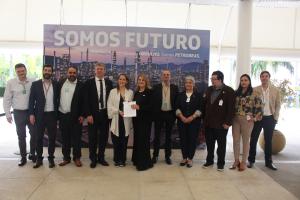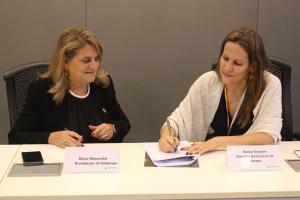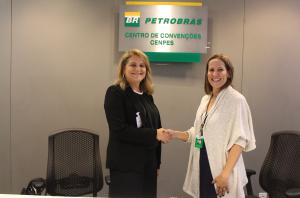O uso deste material é autorizado apenas para fins editoriais.
Petrobras and Embrapa enter into a cooperation agreement to research low-carbon products and fertilizers
This partnership includes studies into renewable raw materials to produce biofuels and develop new fertilizing products
Petrobras News Agency
Silvia Massruhá, Embrapa’s president, visited the Petrobras Research Center and was welcomed by the executive manager, Maiza Goulart
Download Silvia Massruhá, Embrapa’s president, visited the Petrobras Research Center and was welcomed by the executive manager, Maiza GoulartPetrobras and Embrapa signed a Cooperation Agreement (CA) this Friday (6/6) to conduct technical studies on renewable raw materials to obtain low-carbon products, including biofuels, green chemistry, and fertilizers.
This partnership requires Petrobras to devise technological solutions and develop biofuel and bioproduct production plants. Embrapa, in turn, will establish a protocol for low-carbon produce, such as soybean, involving rational agricultural practices, such as this culture’s certification protocol.
The cooperation agreement also includes the development of cultures other than soybeans, off-season, and consortium cultures, such as second-crop corn and Ethiopian mustard (a kind of oilseed), among other options that demonstrate the range of agricultural energy options in Brazil’s different biomes and production systems.
“Diversity and sustainable access to raw materials, quality, and adequate costs are essential to the success of those initiatives, such as biofuels. Furthermore, the company is interested in offering fertilizing products to boost availability in the domestic market and meet the targets of the National Fertilizer Plan. Embrapa has the necessary expertise to contribute to such projects”, said Magda Chambriard, Petrobras’s President.
“For Embrapa, resuming the partnership with Petrobras is a strategy to strengthen its contributions to the rural products and domestic/foreign public policies, mainly in terms of bioeconomics and sustainable development,” declares Silvia Massruhá, the company’s president. She recalled that in 2023, Brazil reached the milestone of 100 million Decarbonization Credits (CBIOS) issued, which will fetch up to BRL 1.2 trillion reais’ worth of investments and savings within the next ten years. “This was possible thanks to Renovacalc, a tool created by Embrapa, which is vital to the National Biofuel Policy (RenovaBio) implemented by the National Oil, Natural Gas, and Biofuel Agency (ANP),” mentioned Massruhá.
Fertilizers: stimulating new products
Regarding the fertilizer sector, the goal is to stimulate the development of new products and put them on the agribusiness market; among those, we can mention new urea-based fertilizers with higher added value, mixed fertilizers, fertilizers with distinctive granulometry, and new sustainable inputs that have a lower environmental impact. Those initiatives aim to pave the way for Petrobras’s business resumption and prime the company for a carbon-free future. Embrapa is an essential partner in developing and proving the agronomic efficiency of those products; we expect to enable farmers to offer and use such innovations by providing fertilizers adapted to the country’s cultures and soil, making for more productive crops in Brazil.
“This partnership includes items such as biomethane and biogas in the context of the Sectoral Plan for Adaptation to Climate Change and Low Carbon Emission in Agriculture, as well as the formation of networks aimed at researching and developing more sustainable raw materials,” revealed Silvia Massruhá.
“We believe the technical and scientific data will be pivotal to developing new products for the fertilizer market. Petrobras is engaged in finding new solutions to supply this sector, which is so strategic to Brazil,” affirmed Chambriard.
The investment in fertilizers returned to Petrobras’s portfolio according to the 2024-2028 Strategic Plan (SP). In August, the company announced it would resume operations in the fertilizer factory of Araucária Nitrogenados S.A. (ANSA) in Araucária (PR) and thereby launch its operations to produce urea, ARLA 32 (Automotive Liquid Reducing Agent) and ammonia in Brazil within the first half of 2025.
Photos



Downloads
Text of this article
Text downloadVideos from this article
You may be interested in
Browse the Sections:
Choose a channel:
Accessibility:
Language:
Select a language:





